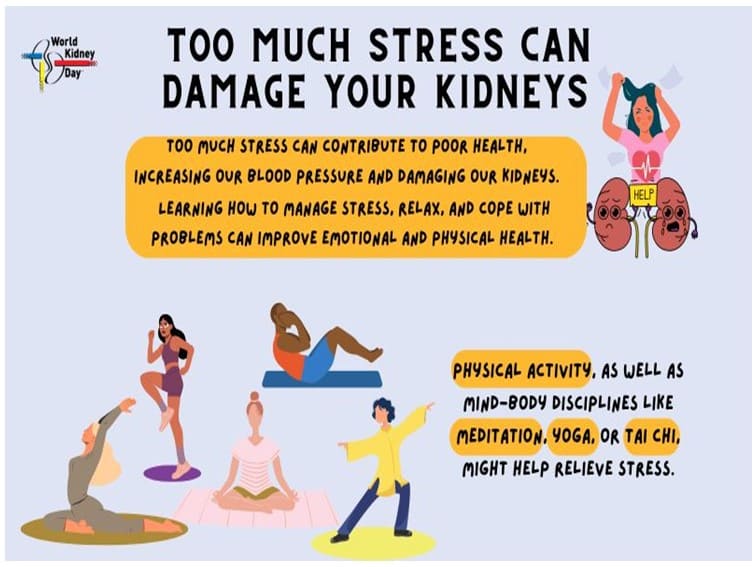Stress is a part of life.
But, excessive stress can affect your health and well-being – we all know this is a fact. But, we often ignore the impact of stress on our health.
Effect of stress on kidneys
Let us try to understand how stress impacts kidneys and the link associated with chronic stress and kidney disease.
Physiological and Psychological Stress
Stress is any disturbance to your normal state or balance. It can be due to physiological or psychological reasons. Any fever, infection, chronic disease, or injury can lead to stress. This is physiological stress. Similarly, a fear of the unknown, job-related, financial losses, and living with a chronic illness – all these events can lead to psychological stress.
We often encounter both these types of stresses at some point in our lives because physiological disturbances and emotionally challenging events are part of our lives.
The human body reacts to stress by releasing hormones that can fight the situation – which is a natural response. These hormones can cause the heart to beat faster, breathing becomes heavy, pupils to dilate, muscles to become tense, and blood pressure spikes. Even blood sugar levels also increase under stress. This is how our body naturally responds to stress. It is commonly known as a fight-or-flight response. It helps in overcoming stressful situations, but constant or chronic stress and the body’s response to it over a period of time can take a toll on our health including our kidney health.
How does Stress impact your Overall Health and Kidneys?
When you are under constantly high levels of stress which is uncontrolled or unchecked, then the physiological changes can progressively harm your health. The cumulative effect of faster heart rate, high blood sugar levels, and increased blood pressure due to chronic stress over a period of time can lead to high blood pressure, diabetes, and cardiovascular disease. All these conditions can potentially lead to kidney disease. Uncontrolled diabetes and Hypertension associated with stress can damage tiny blood-filtering units of kidneys leading to kidney damage, chronic kidney disease, and kidney failure.
The impact of stress on persons with high blood pressure, diabetes, or heart disease can worsen their conditions and can also impact the kidneys causing an increased risk for kidney disease.
In a nutshell, in all circumstances – whether you are healthy, or have chronic conditions you must manage stress to protect your kidneys and overall health.
How to Manage Stress?
Managing chronic stress is a bit challenging – therefore, take steps to never let your stress affect your body. If you are unable to manage stress then take professional help – talk to your family physician or a psychologist.
Some of the useful tips you can follow to manage stress
- Develop a habit of “let go”
- Learn and indulge in relaxing techniques like meditation, acupressure, massage, yoga, and so on.
- Involve in regular physical activities and exercise atleast 30mts per day
- Set up a routine sleep and wake-up timings
- Limit your caffeine and salt intake
- Limit sugars and fats in your diet
- Eat plenty of fruits and vegetables
- Limit screen time by reducing time on phones, laptops, T. V. Listen to soothing and relaxing music
- Have realistic expectations and set achievable goals
- Make it a habit to relax for 5-10mts in between work
- Join social groups, spend time with your friends
- Go on vacation
Bottom Line
Stress plays a huge part in the progression of chronic conditions like Hypertension, Diabetes, and Kidney disease. Therefore,
Stress management is crucial for everyone. Seek help if needed. If you can successfully manage your stress, you can protect your kidneys from the adverse effects of stress. Second, if you already have high blood pressure, kidney disease, or diabetes, then keeping your stress levels under control can help prevent your conditions from getting worse. If you still have any concerns regarding the effect of stress on kidneys, then comment or write to us.

Leave a Reply